Effect of plant densities and cycocel on fruit and yield attributes of Okra (Abelmoschus Esculentus. (L.) Moench) Cv. Parbhani Kranti
Bạn đang xem bản rút gọn của tài liệu. Xem và tải ngay bản đầy đủ của tài liệu tại đây (125.54 KB, 5 trang )
Int.J.Curr.Microbiol.App.Sci (2019) 8(10): 859-863
International Journal of Current Microbiology and Applied Sciences
ISSN: 2319-7706 Volume 8 Number 10 (2019)
Journal homepage:
Original Research Article
/>
Effect of Plant Densities and Cycocel on Fruit and Yield Attributes of Okra
(Abelmoschus Esculentus. (L.) Moench) Cv. Parbhani Kranti
M. Jyothi* and T. B. Tambe
Department of Horticulture, Vasantrao Naik Marathwada Krishi Vidyapeeth,
Parbhani, (M.S.)-431 402, India
*Corresponding author
ABSTRACT
Keywords
Plant density,
Cycocel, Spacing,
Okra, Yield
Article Info
Accepted:
07 September 2019
Available Online:
10 October 2019
An experiment was conducted at College of Horticulture, Vasantrao Naik Marathwada
Krishi Vidyapeeth, Parbhani, during 2018 to know the effect of different plant densities
(60 x 30 cm,60 x 25 cm, 40 x 30 cm and 40 x 25 cm) and foliar spray of cycocel (0, 400,
600 and 800 ppm) on various fruit and yield attributes of okra. Experiment was laid in
Factorial Randomized Block Design with three replications during summer season under
shadenet house. The observations on fruit and yield attributes were recorded during
investigation. Results revealed, that the significant effect of spacing levels on number of
fruits per plant, fruit length, fruit yield per plot and fruit yield per hectare. Whereas,
cycocel levels were found significant for the traits like days to first fruit set, days to first
harvest, number of fruits per plant, average fruit weight, fruit length, fruit yield per plot
and fruit yield per hectare. In case of interaction effects the characters like number of fruits
per plant, average fruit weight, fruit length, fruit yield per plot and fruit yield per hectare
was found significant. Remaining traits were not showed any significant performance
under the experiment. The important characters like number of fruits per plant (9.38),
average fruit weight (17.93 g), fruit length (8.26 cm), fruit yield per plot (10.28 kg) and
fruit yield per hectare (16.13 Mt), were performed significantly maximum at 40 x 25 cm
spacing with the foliar application of cycocel at 600 ppm. However, these characters were
at par with the spacing 40 x 30 cm with the foliar application of cycocel at 800 ppm. Plant
density either at 40 x 25 cm with cycocel at 600 ppm or 40 x 30 cm with cycocel at 800
ppm at 30 and 45 DAS was found better for yield in okra.
Introduction
Okra (Abelmoschus esculentus (L.) Moench)
is an annual vegetable crop belongs to the
family Malvaceae. It’s adaptability to a wide
range of growing condition made it popular
among vegetable growers. Okra crop requires
long warm growing season and it is
susceptible to frost. The optimum day
temperature for its better growth is between 25
to 40oC and that of night is over 22oC. It
thrives in all kinds of soils but to well drained
medium black and light clayey soils, rich in
organic matter and favourable soil pH range
859
Int.J.Curr.Microbiol.App.Sci (2019) 8(10): 859-863
from 6.0 to 6.8 is more suitable for okra
cultivation.
Increasing plant population increases yield per
unit area of okra till a certain limit, beyond
which resources for plant become limited and
the yield decreases (Weimer, 1990). Planting
with proper spacing increases yield quality
and size of fruit. It has been observed that
suitable planting spacing can lead to optimum
okra fruit yield while improper planting
spacing could result in relatively low yield and
poor quality fruits (Maurya et al., 2013).
Hossain et al., (2001) recommended that intrarow spacing for optimal okra fruit yield
ranged from 20 cm to 40 cm. Therefore,
optimum plant population is required for
higher yields of okra.
Suitable planting spacing and cycocel can lead
to optimum okra fruit yield while improper
planting spacing could result in relatively low
yield and poor quality fruits (Maurya et al.,
2013). The present investigation was
undertaken by aiming to produce better more
yield of okra with specific standards viz.
tenderness, 3 to 4 cm in length, uniform in
size, dark green in colour, disease and pest
free with better yield potential per unit area.
Cycocel is growth retardant that inhibits both
cell elongation and cell division It plays an
important role of anti-gibberellin growth
retardant. Appropriate plant densities coupled
with foliar application of cycocel resulted in
increasing fruit yield and quality in okra.
Therefore, the present investigation was
undertaken to study the effect of plant
densities and cycocel on fruit and yield
attributes of okra.
Materials and Methods
The investigation was undertaken at
Instructional cum Research Farm of College
of Horticulture, Vasantrao Naik Marathwada
Krishi Vidyapeeth, Parbhani to know the
effect of plant densities and cycocel on fruit
and yield attributes of okra. The experiment
was laid out in Factorial Randomized Block
Design with three replications during summer
season of 2018 under shade net house. Sowing
was undertaken at four different spacing levels
i.e 60 x 30 cm, 60 x 25 cm, 40 x 30 cm and 40
x 25 cm. Whereas, cycocel was applied as
foliar spray at 30 and 45 days after sowing
(DAS) at four different concentration levels
i.e. 0 ppm (distilled water), 400, 600 and 800
ppm. All, recommended practices like nutrient
and plant protection measures were given
during the experiment. Different commercial
characters of okra were recorded during
growth of the crop viz. days to first fruit set,
days to first fruit harvest, number of fruits per
plant, average fruit weight, fruit length, fruit
diameter, fruit yield per plant, fruit yield per
plot and fruit yield per hectare. Collected
information was subjected to statistical
analysis to test the significance among the
treatments on various characters of okra under
study was done according to the procedure
given by Panse and Sukhatme (1985).
Results and Discussion
Effect of plant density
The results of the experiment indicated that
the significant effect of different plant
densities were shown for the characters like
number of fruits per plant, fruit length, fruit
yield per plot and fruit yield per hectare.
Whereas, other characters like days to first
fruit set, days to first fruit harvest, average
fruit weight, fruit diameter and fruit yield per
plant were found non significant (Table 1).
Number of fruits per plant were recorded
significantly more at spacing of 40 x 25 cm
(8.50) followed by 40 x 30 cm (8.40),
whereas, fruit length was found significantly
maximum in 40 x 30 cm (7.63) followed by 60
x 30 cm and 60 x 25 cm i.e. 7.61 cm and 7.54
cm, respectively. Characters like fruit yield
860
Int.J.Curr.Microbiol.App.Sci (2019) 8(10): 859-863
per plot (7.86 kg) and fruit yield per hectare
(13.36 Mt) was recorded at spacing of 40 x 25
cm followed by 40 x 30 cm (7.31 kg and 12.29
Mt, respectively). Similar results were also
reported by Maurya et al., (2013) and Ekwu et
al., (2012).
S4C4 (40 x 25 cm, cycocel at 800 ppm), S3C3
(40 x 30 cm, cycocel at 600 ppm) and S3C4
(40 x 30 cm, cycocel at 800 ppm) were also
found at par with S4C3 (40 x 25 cm, cycocel at
600 ppm) i.e. 9.16, 9.14 and 9.05 fruits per
plant per ha, respectively.
Effect of cycocel
The characters like average fruit weight, fruit
length, fruit yield per plot and fruit yield per
hectare were also recorded significantly
maximum in S4C3 (40 x 25 cm,cycocel at 600
ppm) viz. 17.93 g, 8.26 cm, 10.28 kg and
16.13 Mt, respectively. Audus (1960) and
Kakade et al., (2010) were also reported
similar findings.
Cycocel showed significant effect on different
characters of okra like days to first fruit set,
days to first fruit harvest, number of fruits per
plant, average fruit weight, fruit length, fruit
diameter, fruit yield per plot and fruit yield per
hectare, whereas, fruit yield per plant was not
shown more difference among the treatments.
Number of fruits per plant was found
significantly maximum (8.50) at floiar
application of cycocel at 600 ppm followed by
800 ppm (7.90). Average fruit weight, fruit
length, fruit diameter, fruit yield per plot and
fruit yield per hectare were recorded
maximum at foliar application of cycocelat
600 ppm i.e. 18.75 g, 7.61cm, 18.75 cm, 7.65
kg and 12.69 Mt, respectively. These findings
are in agreement with those of Singh (2013),
Rajput et al., (2011), Munikrishnappa and
Shantappa (2009), Pateliya (2008) and Parmar
et al., (2008).
Among the treatments, significantly maximum
yield potential was reported from S4C3 (40 x
25 cm with the foliar application of cycocel at
600 ppm) treatment recorded 16.13 Mt per
hectare and whereas, plant density at S4C4 (40
x 25 cm with the foliar application of cycocel
at 800 ppm) and S3C3 (40 x 30 cm with foliar
application of cycocel at 600 ppm) were also
found at par with S4C3 (40 x 25 cm with the
foliar application of cycocel at 600 ppm) with
yield level of 15.97 Mt and 15.53 Mt per
hectare, respectively followed by S3C4 (40 x
30 cm with the foliar application of cycocel at
800 ppm) i.e. 14.11 Mt per hectare.
Effect of interaction
Interaction effects revealed that the traits like
number of fruits per plant, average fruit
weight, fruit length, fruit yield per plot and
fruit yield per hectare was found significant,
while other characters like days to first fruit
set, days to first fruit harvest, fruit diameter
and fruit yield per plant were not shown any
more differences among the treatments (Table
2).
Number of fruits per plant was exhibited
maximum and significant number (9.38) at
S4C3 i.e. spacing at 40 x 25 cm with the foliar
application of cycocel at 600 ppm. Whereas,
Whereas, S1C4 (60 x 30 with the foliar
application of cycocel at 800 ppm) and S1C1
(60 x 30 without the foliar application of
cycocel recorded significantly, the lowest i.e.
10.11 Mt and 10.24 Mt per hectare yield level
out of all the treatments under study. Similar
results were also reported by Maurya et al.,
(2013) and Ekwu et al., (2012).
It is concluded that the spacing at 40 x 25 cm
with the foliar applications of cycocel at 600
ppm at 30 and 45 DAS or spacing at 40 x 30
cm with the foliar applications of cycocel at
800 ppm at 30 and 45 DAS was found better
for fruit yield in okra.
861
Int.J.Curr.Microbiol.App.Sci (2019) 8(10): 859-863
Table .1 Effect of plant densities and cycocel on fruit and yield attributes in okra
Traits/
Treatment details
Days to
Days to
No. of
Average
Fruit length
Fruit
Fruit yield
Fruit yield per
first fruit
first fruit
fruits per
fruit weight
(cm)
diameter
per plant
plot (kg)
set
harvest
plant
(g)
(mm)
(g)
60 x 30 cm
43.85
51.17
6.41c
16.80
7.61a
12.59
115.11
6.14d
S1
b
a
60 x 25 cm
43.28
51.11
7.60
16.96
7.54
12.74
117.20
6.53c
S2
40 x 30 cm
43.12
50.98
8.40a
17.00
7.63a
12.75
118.31
7.31b
S3
40 x 25 cm
42.48
50.53
8.50a
17.27
7.28b
12.88
122.93
7.86a
S4
C.D @ 5%
NS
NS
0.720*
NS
0.177*
NS
NS
0.375*
0 ppm
43.78a
51.70a
6.30b
16.63d
7.28b
16.63d
113.36
6.02c
C1
a
ab
b
c
a
c
400 ppm
43.10
51.00
6.80
17.05
7.57
17.05
119.15
6.24c
C2
ab
b
a
a
a
a
600 ppm
43.05
50.80
8.50
18.75
7.61
18.75
121.3
7.65a
C3
800 ppm
42.80b
50.20b
7.90a
17.69b
7.58a
17.69b
120.12
7.18b
C4
C.D @ 5%
0.885*
0.915*
1.489*
0.415*
0.177*
0.359*
NS
0.375*
Within a treatment group, means in a column followed by the same letter(s) are not significantly different using CD at 5% level of probability.
NS = Not Significant, * = Significant. S= Spacing levels, C= Cycocel levels
Fruit yield per
hectare
(MT/ha.)
10.15d
10.86c
12.29b
13.36a
0.591*
10.11d
10.73c
12.69a
11.68b
0.591*
Table.2 Interaction effect of plant densities and cycocel on fruit and yield attributes of okra
Traits/
Treatment details
T1
T2
T3
T4
T5
T6
T7
T8
T9
T10
T11
T12
T13
T14
T15
T16
S1 C1
S2 C1
S3 C1
S4 C1
S1 C2
S2 C2
S3 C2
S4 C2
S1 C3
S2 C3
S3 C3
S4 C3
S1 C4
S2 C4
S3 C4
S4 C4
C.D @ 5%
Days to
first fruit
set
44.73
44.47
43.87
43.53
43.51
43.33
43.27
43.20
43.07
42.93
42.53
42.07
42.87
42.73
42.60
42.20
NS
Days to first
fruit harvest
No. of fruits
per plant
52.80
51.85
51.80
51.61
51.60
51.20
51.01
51.00
50.81
50.80
50.20
48.93
50.61
50.60
50.50
49.87
NS
7.74e
8.07de
8.16d
8.19d
8.18d
8.17d
8.27d
8.31d
8.34d
8.78c
9.14ab
9.38a
8.85b
8.90b
9.05abc
9.16ab
0.355*
Average
fruit weight
(g)
15.91e
16.06e
16.61de
16.73cde
16.74cde
16.94bcd
16.99bcd
16.99bcd
17.05bcd
17.08bcd
17.50abc
17.93a
17.12abcd
17.42abcd
17.49abc
17.59ab
0.831*
Fruit length
(cm)
6.86h
7.03g
7.22f
7.25f
7.27ef
7.29ef
7.29ef
7.31ef
7.38e
7.70d
7.95c
8.26a
7.71d
7.72d
7.86c
8.13b
0.122*
Fruit
diameter
(mm)
12.01
12.28
12.45
12.44
12.65
12.67
12.71
12.75
12.82
12.86
12.91
12.97
13.00
13.02
13.04
13.24
NS
Fruit yield
per plant (g)
Fruit yield per
plot (kg)
Fruit yield per
hectare (MT/ha.)
104.18
106.09
111.07
115.29
116.89
117.31
117.48
118.94
119.71
121.01
123.69
132.13
121.27
121.34
123.37
124.44
NS
6.61e
6.91de
6.96de
7.03de
7.11de
7.11de
7.23de
7.36de
7.40d
7.45d
9.92ab
10.28a
7.45d
8.84c
9.22bc
10.18a
0.751*
10.24f
10.4 f
10.44f
10.52f
10.69ef
10.76ef
10.85ef
11.83de
12.07d
12.25d
15.53ab
16.13a
10.11f
13.74c
14.11bc
15.97a
1.182*
Within a treatment group, means in a column followed by the same letter(s) are not significantly different using CD at 5% level of probability. NS = Not Significant, * =
Significant
S= Spacing levels, C= Cycocel levels
862
Int.J.Curr.Microbiol.App.Sci (2019) 8(10): 859-863
References
Audus, L. J, (1960). In encydopedia of plant
physiology (Ed. L. Ruhaland).
Spmger Berlin, 3(2); 360-387.
Ekwu,L.G. and Nwokwu, G.N. (2012) Effect
of plant spacing and planting date on
the growth and yield of okra
(Abelmoschus
esculentus
(L.)
Moench). In Abakaliki. Int J. Agric.
Rural Dev.
Kakade, D, K., H. B Patel, S. Rukum, G. V.
Tomar, G. Kulkami, N. A. Memane,
S. J. Deshmukh, Sharma and C. D.
Patel (2010). Effect of plant growth
regulators on sex expression and
yield of sponge gourd. The Asian J.
of Hort., 4(2): 408-410.
Maurya R. P., Jamar A. Bailey, Jeff St. A.
Chandler. (2013) Impact of plant
spacings and picking interval on the
growth, fruit quality and yield of okra
(Abelmoschus
esculentus
(L.)
Moench). Ameri. J.of Agri and
Forestry, 1(4): 48- 54.
Munikrishnappa, P. M. and Shantappa
(2009). Influence of seed treatment
and foliar application of growth
regulators on growth and yield of
bhendi (Abelmoschus esculentus) Cv.
Arka Anamika. J. Ecol. biology,
25(4): 323-328.
Panse, V.G. and Sukhatme, P.U. (1985).
Statistical Methods for Agricultural
Workers,
Indian
Council
of
Agriculture Research, New Delhi. pp:
199-216.
Parmar, B. R., C. K. Pateliy and Y. N.
Tandel (2008). Effect of different
growth retardants on flowering, yield
and economics of okra (Abelmoschus
esulentus L.) Cv. Go-2 under South
Gujarat conditions. The Asian J. of
Hort.,310 (2): 317-318.
Pateliya, C.K., Parmer, B.R. and Tandel,
Y.N.(2008). Effect of different
growth retardants on flowering, yield
and economic of okra Cv. Co-2 under
South Gujarat conditions. The Asian
J. of Hort.3(2): 317-318.
Rajput, B. S., Singh, A. Patel, P. and
Gautam, U. S. (2011). Study of
different plant growth retardants on
flowering, fruiting, yield and
economics of okra (Abelmoschus
esculentus (L.) Moench). Progr.
Hort., 43(1): 166-167.
Singh K. P. (2013). Effect of growth
retardants on reproductive characters
and yield of okra Cv. Parbhani
Kranti. Indian J. Hort., 70(1): 154155.
Hossain M.D., Rahman M.A., Hoque M.M.,
Islam M.S. and Salam M.A. (2001).
Year round okra production and
economic return as influenced by
spacing
in
Barisal
Region.
Bangladesh J. Agric. Res. 26, pp.
319-328.
Weimer, R. (1990). Agroecology. Mc Graw
Hill Book Co. Inc., New York.
How to cite this article:
Jyothi, M. and Tambe, T. B. 2019. Effect of Plant Densities and Cycocel on Fruit and Yield
Attributes of Okra (Abelmoschus Esculentus. (L.) Moench) Cv. Parbhani Kranti.
Int.J.Curr.Microbiol.App.Sci. 8(10): 859-863. doi: />
863
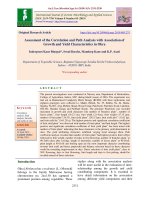
![Effect of precision farming techniques involving fertigation and mulching on growth attributes and seed yield of okra var. Arka Anamika [Abelmoschus esculentus (L.) Moench]](https://media.store123doc.com/images/document/2020_01/14/medium_ynr1578936108.jpg)
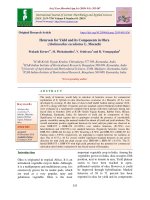
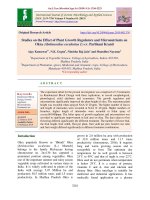
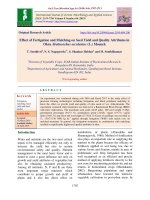
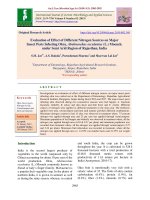
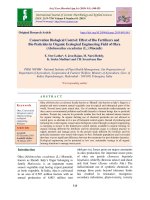
![Correlation and path coefficient analysis of fruits yield and yield attributes in okra [Abelmoschus esculentus (L.) Moench]](https://media.store123doc.com/images/document/2020_01/14/medium_ckb1578982226.jpg)

